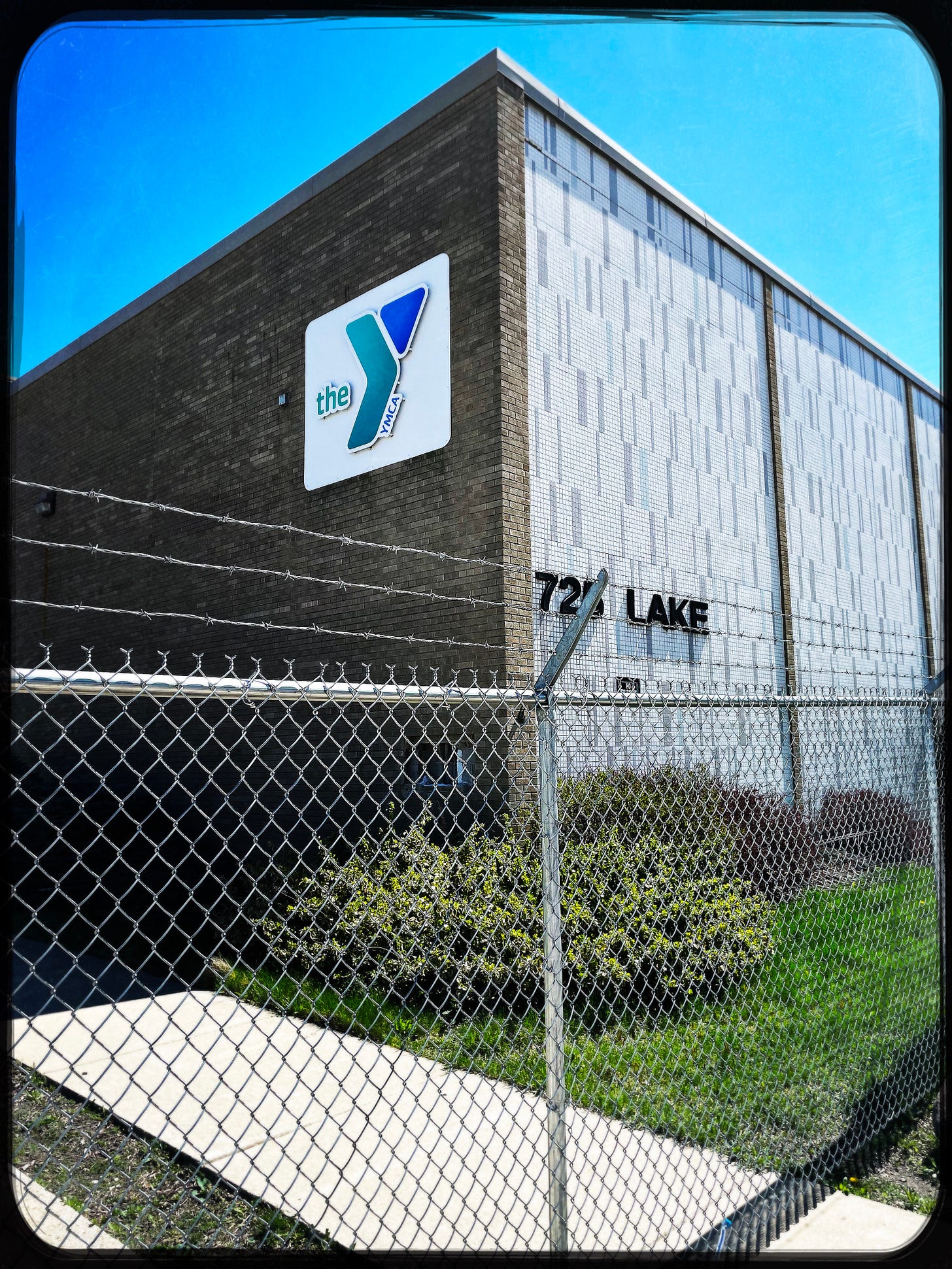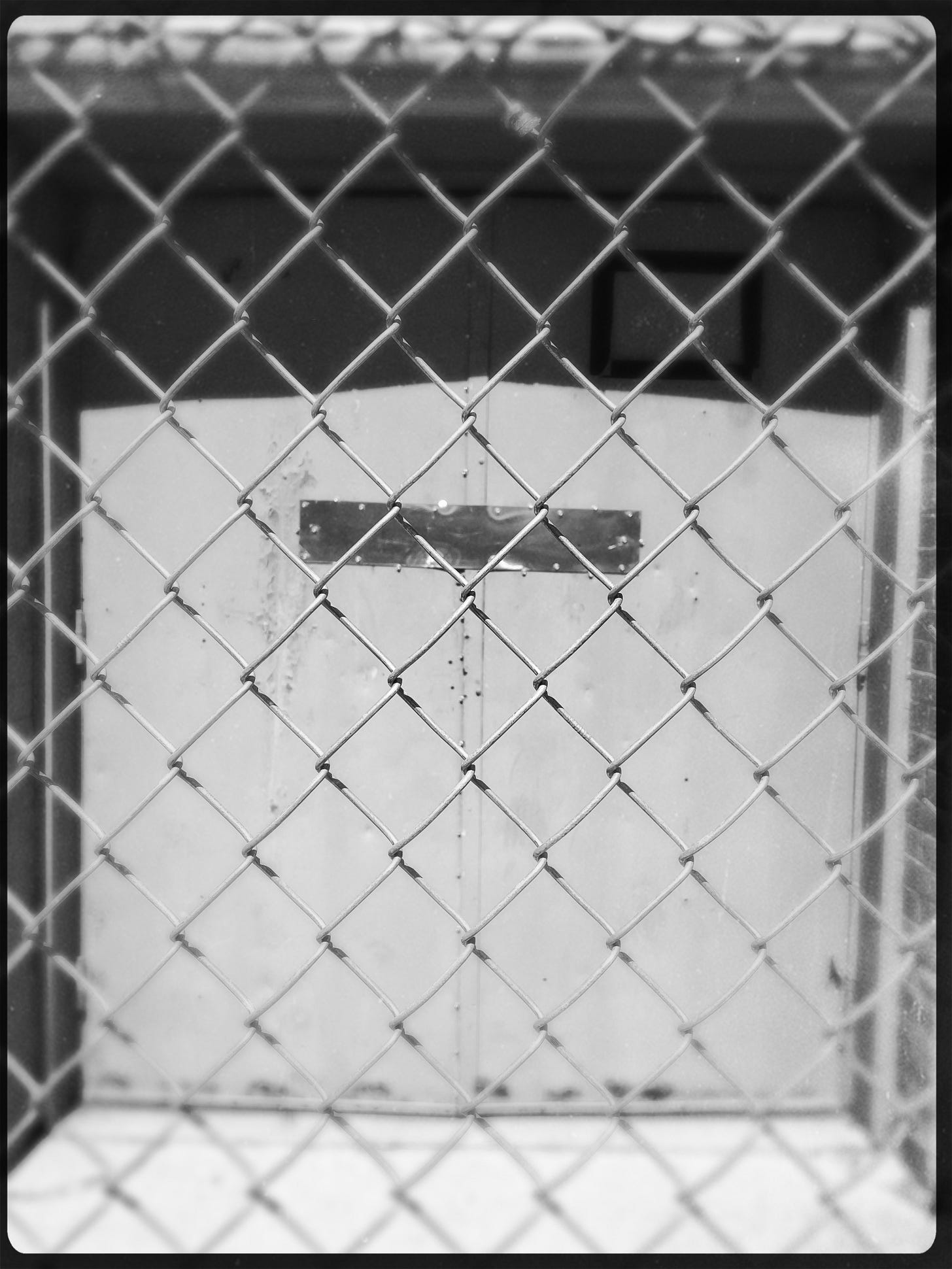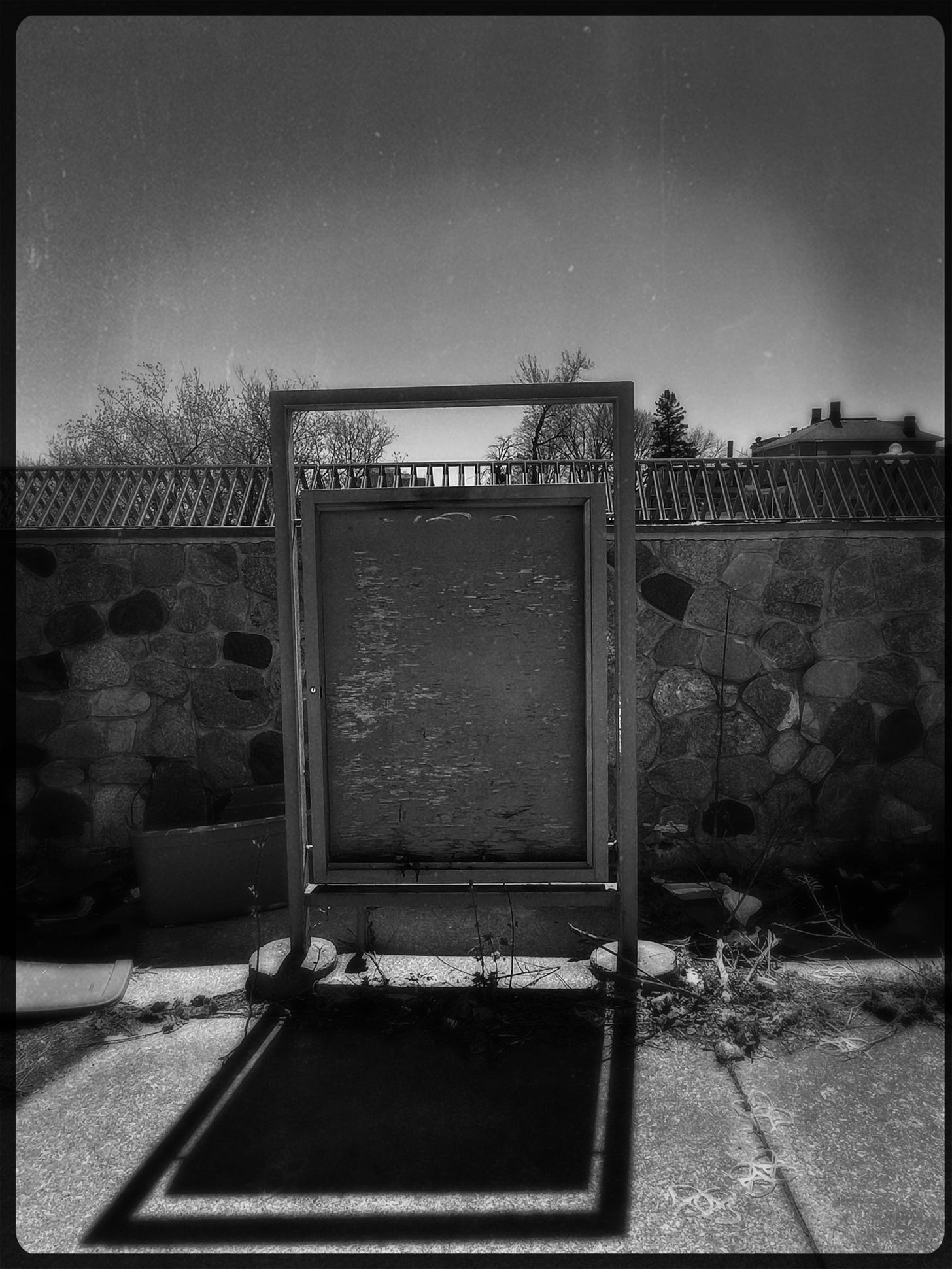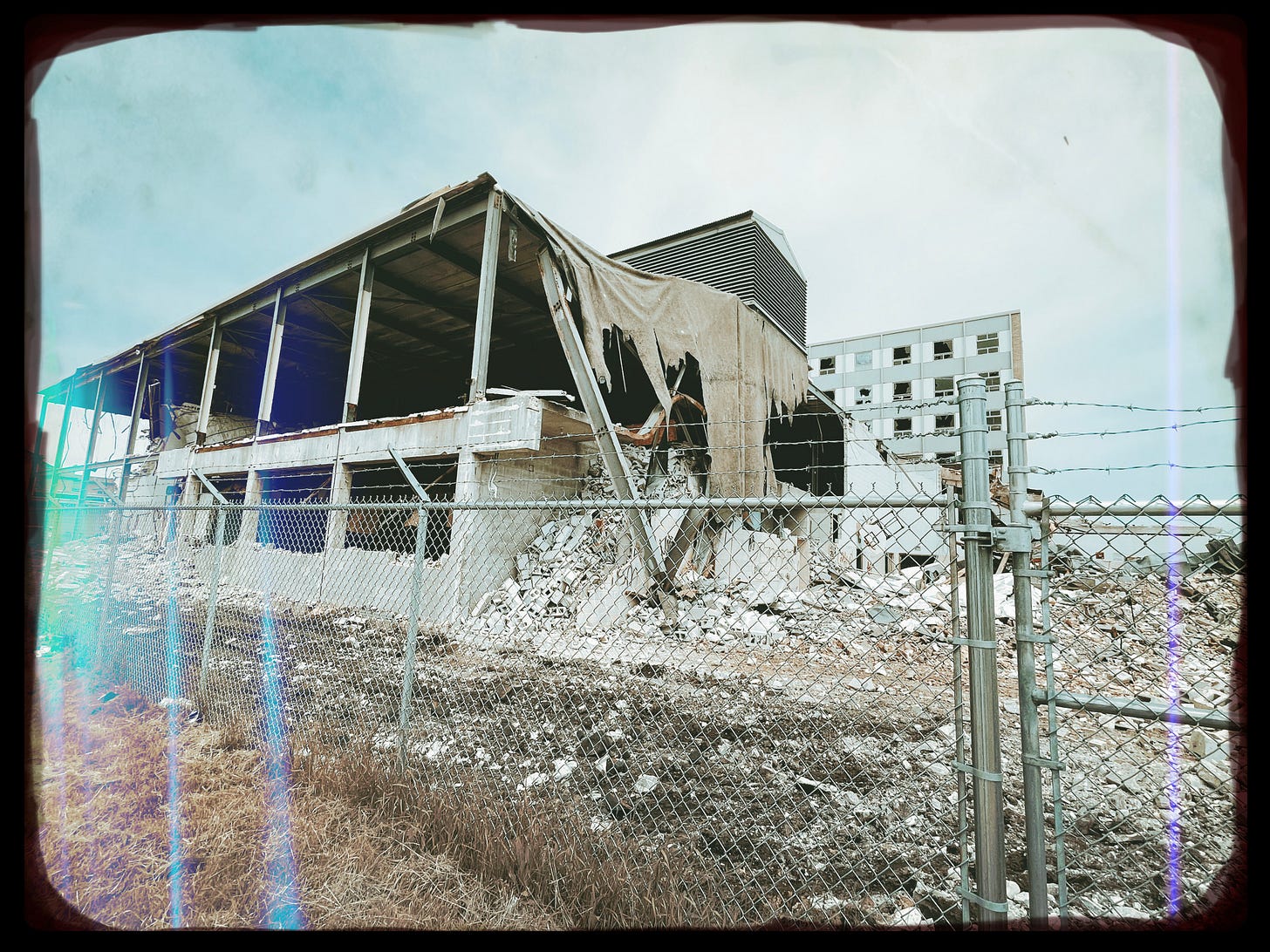[this piece was originally published as a stand-alone mini zine in May 2024]
A few years back, they closed the old YMCA downtown. It had been falling apart for a long time, and instead of revamping and reopening it after the height of the pandemic passed, they built a new facility, way out in the suburbs. The old one was left to rot; emptied of everything but detritus and ghosts, and the occasional homeless person camping out in the old SRO apartments left over from when you could, actually, stay at the YMCA. The building was up for sale for a long time, and I guess I hoped that someone would buy it and change it into…well, something. Anything. But no one bought it until, finally, the city did, and decided that at some point they’re going to raze it. They have to, they said. It’s unfixable. An eyesore. Dangerous—both structurally, and because of the squatters. I have no idea what the site will become, but it will probably be a fucking parking lot.
Until then, it’s still there, moldering further; now surrounded by a tall chain-link fence topped with razor wire, because they’ve gotta keep all those ‘dangerous’ homeless folks from having anywhere to sleep, not to mention preventing the occasional curious urban explorer from venturing in. So, one day in April, with the raw-wet wind blowing off Lake Michigan, I decided to walk around the perimeter and take some pictures, to memorialize the place I wasted so many nights back when I was a mixed-up alterna-teen.
I never went there to exercise, mind you. No, I went to the YMCA to see shows. I don’t remember exactly when I first went to a show there, or who I saw. I must have been twelve or thirteen, as that’s when I first got into punk and indie and other types of outsider rock’n’roll; which means it would have been 1994 or 1995. And then, for four or five years after that, I went to shows there weekly. Well, that’s not quite accurate. In my memories, it seems like I was there every week, but in reality it was probably once (or at most, twice) a month. Still. It’s true that, from the mid-‘90s through the end of that decade, I spent a lot of time at the YMC fuckin’ A.
I walked around the outside of the derelict building, snapping pictures of trash (empty tequila bottles, crushed packs of Kools, styrofoam to-go cups) left by vagrants, partiers, and careless passers-by. I took photographs of the busted-out windows, scrawls of graffiti, bits of wood and metal things that are so broken-down now you can’t even tell what they were originally for.
The wind howled and rattled down the empty halls and out through the jagged, shattered windowglass, and I thought, of course, about ghosts. The ghosts of friends I hung out with there, who have since died or disappeared; the ghost of my old self, from back in those days. Even the ghosts of the men who used to stay in the SRO apartments, and the generations of kids who took classes and played sports there. I always wonder where the ghosts go when a place gets torn down. If ghosts are soul-entities of the dead, then maybe they can disperse, move elsewhere, when a place they loved or spent a lot of time in gets destroyed. But what if ghosts are more like psychic imprints on a place? A sort of residue made by someone performing the same action over and over in a specific location, so that even when their physical body has left that place, they leave behind a kind of hologram of themselves that still performs that action? What then? Does all that just…disappear when the place does?
Then I reached the side door—the Youth Entrance. The gym is where the shows were held, and the Youth Entrance is where we entered, to pay the cover and get our hands stamped or Sharpie’d. And it’s where we went in and out the rest of the night—to hang out with friends, or kiss crushes, or be alone, or get some fresh air, or smoke a cigarette, or whatever.
I could picture my teen self sitting right there, on the dirty pavement. Wearing jeans and a ripped-up tee—or a plaid skirt and fishnets if I wanted to look cute—Docs or Chucks on my feet. Jacked up on caffeine from the coffee I’d pounded before the show started, hoping for someone to give me a surreptitious sip of some booze or a hit off a joint to take the edge off. I saw my old self, and then came the flood of memories—
Memory: Seeing bands with names like Bound to One, The Girlfriends, Kids On Waffles, Maple Drive, Only Airplanes County (later Forstella Ford), Phuzzz (later Quazi-Stellar), Shunned, Sniffin’ Dog Ears, and countless others, some whose names I can no longer recall.
Memory: Making flyers for Battle of the Bands, hoping that the band-boys I had crushes on would see all the work I put in and appreciate me.
Memory: Trying to convince some guy friends of mine who were starting a band to open their first show with a punk cover of “YMCA,” and them saying: “Yeah, it’d be cool and all, but then people might think we’re gay.” And how I understood that they weren’t homophobic, but that there were people in our town who would try and ruin your life if there was the merest whisper of you being queer. But I was bummed, and secretly thought that if they were really punk, they would have said “fuck it,” and done it anyway.
Memory: When I heard there was a new local band called Reject All American, and I got all excited thinking they’d named themselves after the Bikini Kill album, and assumed they’d be an all-girl or at least part-girl band. And then I went to see them…and they were all boys, as usual.
Memory: How I always wanted to start my own (all-girl) band and play shows there but the only band I formed in the '90s never played any shows, anywhere.
Memory: That time during sound check, when Nolan tried to tell a riot grrrl lightbulb joke. He said: “How many riot grrrls does it take to change a lightbulb? Two. One to change it, and one to write a song about it.” Later, his bandmate/my friend Sam apologized to me on behalf of the entire band—as I was one of a small handful of Known Riot Grrrls in Racine. He said he hoped I wasn’t offended. I told him I wasn’t, because it didn’t even make enough sense to be offensive. (Even later, I found out that the joke is supposed to go like: Q: How many riot grrrls does it take to change a lightbulb? A: Two. One to change it, and one to write a song about how she did it so much better than a man could. Which is still not very funny, but at least there’s an actual punchline there.)
Memory: Sitting or standing around outside that door, bumming cigarettes off older friends; smoking cigarettes, smoking joints. Drinking malt liquor, or vodka-and-Koolaid cocktails disguised in reusable bottles. Shivering inside a too-thin hoodie in the winter and spring months; sweating through my t-shirts in the summer. How fall was the perfect time to be out there—hoodie weather, coffee and cigarette weather, red-tinted leaves swirling around my booted feet.
Memory: Talking with friends, laughing with friends. Writing in my ever-present notebook, making notes for my next zine. Making eyes at my crushes, wishing they’d notice me. Feeling like none of my crushes would ever want me. Most girls I had crushes on were straight, and even if they weren't, I was too scared to make my feelings known. And the guys, well. I was too much of an angry, dirty punk for the emo and indie boys, and the punk boys seemed to prefer dating teenybopper girls. I felt like an outcast among outcasts, much of the time—yet somehow I still usually found a guy to make out with, in the bathroom, or off in the bushes on the other side of the building. Usually someone from a couple towns over, whose band happened to be in my town that night, or who was visiting friends. As much as I wished my local crushes would notice me, I also liked to keep my lovers at a distance.
Years later, I found out a lot of those feelings stemmed from my own myopic misperceptions and fucked-up brain chemistry. True, there were people who legitimately bullied me throughout middle school and into high school. True, I’d had my share of romantic rejections. But it turned out I wasn’t a total outcast, or uniquely undesirable. In my twenties, even into my thirties, I’d sometimes run into people who remembered me from those days, and discovered that they’d felt the same way about me as I’d felt about them. Meaning—while I was busy thinking all my crushes and acquaintances were too cool for me, many of my crushes and acquaintances though I was too cool for them.
And, of course, I remembered the night I decided to dress emo, and met my Punk Rock Dream Come True. When I got dressed that night, I'd had the idea that maybe if I dressed the part of an emo girl, the emo boys would finally want me (and there were a lot of emo boys ‘round these parts, in 1998). So I did it; dressed midwest ‘90s emo in a baseball tee and my best black jeans, even wore some thick-framed glasses Elvis Costello would’ve envied. And then, while I was sitting outside with friends before the bands began, up walked Joaquin. He had half-tousled, half-spiky hair, a tight black sleeveless undershirt, jeans all torn at the knees, three fuckin’ belts (studs, bullets, spikes), combat boots. He was lean, yet muscular, with prominent blue veins on his arms (junkie veins, though I didn’t know that yet). He said ‘hey’ to the folks he knew, and then locked eyes with me. He had the bluest eyes I’d ever seen; not stormy lake-water blue-gray like mine, but an ice-blue that pierced right through me. “And who is this?” he asked, still looking at me, his lips curving into a devilish grin. My pulse fluttered in my lower abdomen, a physical reaction that I’d eventually figure out was lust, pure and simple, but that at the time I still mistook for love at first sight. I thought: “Fuck, I should’ve dressed in my usual punk style tonight,” but for all that, it didn’t really seem to matter. One of our mutual friends introduced us, and Joaquin fucking kissed my hand, and the flutter became a full-on throb.
Later that night, I learned the reason for his prominent veins. Someone passed around a joint, and Joaquin said something like: “Thank God for drugs.” Then laughed a little and said: “Though they’re not the drugs I wish I had right now.” “We all know what drugs you wish you had, dude,” one of his friends replied, and mimed tying off his arm and tapping for a vein. And perhaps learning of his junkiehood should've put the damper my crush, but it didn’t. Hell, it probably made me crush even harder. I was young and dumb enough that I still thought smack was glamorous (and that would last until I had my own struggles with it), and besides—I was drawn to people who were self-destructive. Though I wasn’t yet into hard drugs, I was already hurling myself towards oblivion, and I was most attracted to people who might hold my hand while we raced towards the cliff’s edge together.
Joaquin and I never did become lovers, but we did become close friends. Standing there by the Youth Entrance, I remembered that first night, and a hundred other days and nights with him, at the YMCA and elsewhere. And I thought about how he died—an overdose—and how, even though it was twenty years ago, god damn it, I miss my dead friend.
I walked on, then, to take some more photographs, still thinking of ghosts, and Joaquin. A small black butterfly with white and red spots on the tips of its wings flew around my head once, twice, three times, then lit on a clutch of dandelions that was growing from a crack in the pavement, between gaps in the fence. I like to think it was Joaquin, saying hello. Because all butterflies are ghosts—but if Joaquin were a butterfly, he’d absolutely be a black one adorned with strange markings.
Part of me wanted to go inside the building. There was a time in my life when I would have returned under cover of night, with a pair of wire cutters, and cut a hole in the fence to squeeze through; or braved the razor wire and scaled the fence. But I left my urban exploration days behind when I had children; I’m more fearful, now, of the consequences. It’s not that I’m afraid of injury, or even of who—or what—I might find inside an abandoned building. It’s that, since I had kids, I no longer want to risk getting arrested for something like trespassing. So I didn’t go inside; just took a few more photos from outside the building.
I don’t have a neat summation for what I’m feeling around all this, or why. I’m just sad. Yes, I’m sad that a place that once meant something to me will get torn down—I wrote a similar essay, nine years ago, about a place I loved in Chicago getting demolished so they could build luxury apartments. I’ve never quite been able to explain why I care so much about physical structures, that have long since closed down or been repurposed or that I haven’t been to in many years, getting torn down. People have tried to remind me that I’ll still have the memories, but, to misquote Joan Didion—memories are, by their very nature, of times past and things (and people) gone. I’m the type of person that wishes all the buildings I ever spent significant time in would stand forever, falling in on themselves, as monuments to my lost youth. As a resting place for (my) ghosts.
But that’s not the only reason I’m sad about the YMCA. I’m sad because it reminds me of what has been taken from us. By ‘us,’ I mean everyone, at least here in the USA. We are losing our third spaces, and it’s even worse for teenagers. Malls are dying—and as much as I hated malls as a teen, they were at least somewhere you could go and walk around without spending much money. The live music venues that do still exist, at least where I live, are mainly bars, so no one under 21 can even see a show, let alone put one on. In both indoor and outdoor locations, loitering is increasingly cracked down upon. Even in places like public parks, where anyone should be able to spend as much time as they want, teenagers tend to get policed more closely than people of other age groups. It’s not like my friends and I were never hassled by business owners or cops when we were teens, but it has definitely ramped up in recent years.
So where can teenagers go that costs little to no money? Where can they go to hang out together? The library’s free, sure, and there are programs for teens there—but there’s also a lot of adult supervision, and therefore not much mischief can be made. I’m not saying that teenagers should be out getting wasted and committing crimes like I did, but I do think it’s important for them to get into a little bit of good trouble. I also think that they should be able to have spaces where they can hang out and talk to other teens without adults overhearing. And, yes, they should have outlets for their self-expression, including starting bands—and have places for those bands to play.
I guess what it comes down to is that, while my teen years were often miserable, I had things that helped me through, and I want teenagers now to have those, too. I want to think that teens are still starting punk and indie bands, and setting up makeshift skateboard ramps in parking lots, and writing their name + the name of their crush in Sharpie on park benches and brick walls. I want the kids to have fun, and be alright.
A month or so after I took the photos, I was driving on the lakeshore road that curves around behind the Y. I glanced up at it, and saw two young people, in torn jeans and black hoodies, walking towards it, with their arms around each other. I looked away for a split second, and when I looked back—they were gone. Maybe they’d disappeared into the building, or the bushes, or underneath the bleachers, to make out, or smoke a joint, or scrawl their names.
Or maybe, just maybe, I briefly glimpsed the ghosts of myself and my old friends.
Addendum (June 2025):
Walkin’ downtown one last time just before I moved away from Racine (again, for good), I saw that they were finally razing the building. So I took some more photos.
As sad as it still makes me, it seems kinda poetic that this place that meant so much to me in my teen years is getting torn down just as I’m leaving town, too.














It is fascinating how we can all be at the same places yet in such completely different worlds. Great essay.
I have a friend who says ghosts are energy stains. Like a piece of somebody left behind doing something repetitively because of its emotional or spiritual significance. I like this essay. I went to a few punk shows growing up. Not as much as I wanted to.